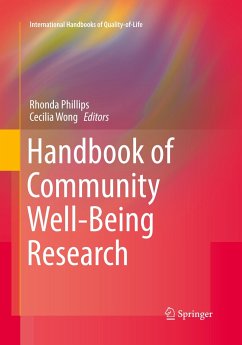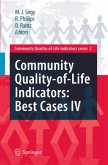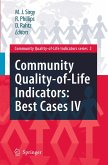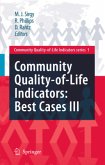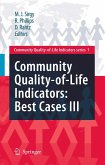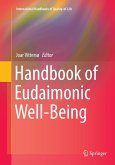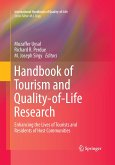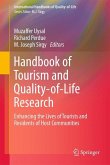Handbook of Community Well-Being Research
Herausgegeben:Phillips, Rhonda; Wong, Cecilia
Handbook of Community Well-Being Research
Herausgegeben:Phillips, Rhonda; Wong, Cecilia
- Broschiertes Buch
- Merkliste
- Auf die Merkliste
- Bewerten Bewerten
- Teilen
- Produkt teilen
- Produkterinnerung
- Produkterinnerung
This Handbook brings together foundational and leading-edge research exploring dimensions of improving quality of life in communities of place. Social indicators and other assessment techniques will be explored, including from the framework of community perspectives which is concerned with enhancing quality of life for community members. As part of this trans-disciplinary work, participation, engagement, and empowerment will be key concepts presented. Along with capacity building and service provision, these elements influence community well-being and will be considered along with subjective…mehr
Andere Kunden interessierten sich auch für
![Community Quality-of-Life Indicators: Best Cases IV Community Quality-of-Life Indicators: Best Cases IV]() Community Quality-of-Life Indicators: Best Cases IV74,99 €
Community Quality-of-Life Indicators: Best Cases IV74,99 €![Community Quality-Of-Life Indicators: Best Cases IV Community Quality-Of-Life Indicators: Best Cases IV]() M. Joseph Sirgy / Rhonda Philips / D. Rahtz (ed.)Community Quality-Of-Life Indicators: Best Cases IV125,99 €
M. Joseph Sirgy / Rhonda Philips / D. Rahtz (ed.)Community Quality-Of-Life Indicators: Best Cases IV125,99 €![Community Quality-of-Life Indicators: Best Cases III Community Quality-of-Life Indicators: Best Cases III]() Community Quality-of-Life Indicators: Best Cases III74,99 €
Community Quality-of-Life Indicators: Best Cases III74,99 €![Community Quality-Of-Life Indicators: Best Cases III Community Quality-Of-Life Indicators: Best Cases III]() M. Joseph Sirgy / Rhonda Phillips / D. Rahtz (ed.)Community Quality-Of-Life Indicators: Best Cases III125,99 €
M. Joseph Sirgy / Rhonda Phillips / D. Rahtz (ed.)Community Quality-Of-Life Indicators: Best Cases III125,99 €![Handbook of Eudaimonic Well-Being Handbook of Eudaimonic Well-Being]() Handbook of Eudaimonic Well-Being243,99 €
Handbook of Eudaimonic Well-Being243,99 €![Handbook of Tourism and Quality-of-Life Research Handbook of Tourism and Quality-of-Life Research]() Handbook of Tourism and Quality-of-Life Research221,99 €
Handbook of Tourism and Quality-of-Life Research221,99 €![Handbook of Tourism and Quality-of-Life Research Handbook of Tourism and Quality-of-Life Research]() Handbook of Tourism and Quality-of-Life Research251,99 €
Handbook of Tourism and Quality-of-Life Research251,99 €-
-
-
This Handbook brings together foundational and leading-edge research exploring dimensions of improving quality of life in communities of place. Social indicators and other assessment techniques will be explored, including from the framework of community perspectives which is concerned with enhancing quality of life for community members. As part of this trans-disciplinary work, participation, engagement, and empowerment will be key concepts presented. Along with capacity building and service provision, these elements influence community well-being and will be considered along with subjective and objective assessment approaches. Researchers from around the globe share their work on this important topic of community well-being, bringing together a diverse array of disciplinary perspectives. Those working in the areas of public policy, community development, community and social psychology, urban and regional planning, and sustainable development will find this volume particularly usefulfor the array of approaches presented.
Produktdetails
- Produktdetails
- International Handbooks of Quality-of-Life
- Verlag: Springer / Springer Netherlands
- Artikelnr. des Verlages: 978-94-024-1425-7
- Softcover reprint of the original 1st ed. 2017
- Seitenzahl: 632
- Erscheinungstermin: 20. Juli 2018
- Englisch
- Abmessung: 254mm x 178mm x 34mm
- Gewicht: 1171g
- ISBN-13: 9789402414257
- ISBN-10: 9402414258
- Artikelnr.: 53581709
- Herstellerkennzeichnung Die Herstellerinformationen sind derzeit nicht verfügbar.
- International Handbooks of Quality-of-Life
- Verlag: Springer / Springer Netherlands
- Artikelnr. des Verlages: 978-94-024-1425-7
- Softcover reprint of the original 1st ed. 2017
- Seitenzahl: 632
- Erscheinungstermin: 20. Juli 2018
- Englisch
- Abmessung: 254mm x 178mm x 34mm
- Gewicht: 1171g
- ISBN-13: 9789402414257
- ISBN-10: 9402414258
- Artikelnr.: 53581709
- Herstellerkennzeichnung Die Herstellerinformationen sind derzeit nicht verfügbar.
Rhonda Phillips' research and outreach efforts focus on quality of life and well-being related to community and economic development. At Purdue, she serves as Dean of the Honors College, and a Professor in the Agricultural Economics Department. Rhonda is author or editor of 20 books, including Sustainable Communities, Creating a Durable Local Economy; Community Development Indicators Measuring Systems; and Introduction to Community Development. She is editor of the series Community Quality of Life and Well-Being. Formerly a Senior Sustainability Scientist with the Global Institute of Sustainability, Rhonda served as director and professor in the School of Community Resources and Development at Arizona State University, and founding director of the University of Florida's Center for Building Better Communities. She is a member of the College of Fellows of the American Institute of Certified Planners (FAICP). She is currently President of the International Society for Quality-of-Life Studies and a co-researcher with the Community Wellbeing Institute, a Social Science Korea Project. Cecilia Wong is Professor of Spatial Planning and Director of Centre for Urban Policy Studies at the University of Manchester. She is a Fellow of the UK Academy of Social Sciences, Co-Editor of Town Planning Review, and Member of the UK Economic and Social Research Council's Grant Assessment Panel. She is a chartered town planner and received degrees from the Chinese University of Hong Kong, the University of Liverpool and the University of Manchester. Her research interests include quantitative indicators, spatial policy monitoring and analysis, urban and regional development, and housing and infrastructure planning. She has conducted major research projects for the UK central government departments, Economic and Social Research Council, Joseph Rowntree Foundation, Royal Town Planning Institute, and regional and local bodies. She was a commissioner of theUK Labour Party's Lyons Housing Review and expert panel members of Department for Community and Local Government's planning and housing panel, the European Commission's Urban Audit II and the UN-Habitat City Prosperity Index (Middle East).
Part I. Foundations.- Chapter 1. Community Functioning that Fosters Sustainable Personal Well Being, Ronald E. Anderson.- Chapter 2. Self-Expression and Elite-Challenging Activities: A Punk Rock Approach to Community Well- Being; Craig Talmage, C. Bjorn Peterson and Richard Knopf.- Chapter 3. The ART of Hope: Healing the Wounded City; Derek Cook.- Chapter 4. A Multi-Dimensional Model of Community Well-being from a Public Service Delivery Perspective.- Chapter 5. Sustainable Neighborhoods for Happiness: A Framework for a Sustainable Future; Scott Cloutier and Deirdre Pfeiffer.- Part II. Engaging and Participating for Well-Being.- Chapter 6. Community-University Engagement for Community Well-Being with Métis Settlements in Alberta, Canada; Fay Fletcher, Alice Hibbert and Brent Hammer.- Chapter 7. Achieving Development and Community Well-being through Participatory Governance: The Case of Saemaul [New Community] Movement; Seung Jong Lee, Seoul National University, and Yunji Kim.- Chapter 8. A Citizen-Led Approach to Enhancing Community Well-Being; Sylvia Cheuy, Tamarack, Leesa Fawcett, Karen Hutchinson and Tracey Robertson.- Chapter 9. Digital Communications and Community Well-being; Claire Wallace and Kathryn Vincent.- Chapter 10. Festivity, Play, Well-Being: A Relationship and its Implications for Community Development; Vern Biaett.- Part III. The "Health" of Well-Being.- Chapter 11. What We Can Learn from America's Highest Well-Being Communities; Dan Witters.- Chapter 12. Public Health and Urban Planning: Challenging Options for Well-Being; Sabine Baumgart.- Chapter 13. Community-Driven Health Impact Assessment and Asset Based Community Development: An Innovative Path to Community Well-Being; Colleen Cameron and Tanya Wasacase.- Chapter 14. The Human Development Approach Stimulates a Fact-Based Conversation in Sonoma County, California; Sarah Burd-Sharps, Patrick Nolan Guyer and Kristen Lewis.- Chapter 15. Community Capacity inEnd of Life Care: Can a Community Development Model Address Suffering and Enhance Well-Being?; Kyle Whitfield and Martin LaBrie.- Part IV. Planning, Design, and Measuring.- Chapter 16. From National to Local: Measuring Well-Being at the Community Level; Bryan Smale and Margo Hilbrecht.- Chapter 17. Building Well-Being: Community Flourishing and Tools for Collaborative Urban Design; Jamie Anderson and Cathy Baldwin.- Chapter 18. Stakeholder Preferences on a Working Waterfront: Quality of Life, Land Uses and Planning Processes in Chelsea, Massachusetts; Justin Hollander and Jessica Soule.- Chapter 19. LISADEMAS: A Life Satisfaction Decision Making System for Integrated Community Development Planning; Vaios Kotsios.- Chapter 20. A Geographic and Mixed Methods Approach to Capture Unequal Quality of Life Conditions; Javier Martinez, Jeroen Verplanke and Gianluca Miscione.- Chapter 21. Community Quality-of-Life Indicators: Distinguishing Distressed Communities from Flourishing Communities; M. Joseph Sirgy, Don R. Rahtz, and Clifford J. Shultz II.- Chapter 22. Integrating Community Well-being and Happiness: Applications in Seoul, Korea and Frankfurt, Germany; Yunji Kim and Kai Ludwigs.- Chapter 23. Delivering Community Well-Being from the Happy City Concept: A Practical Approach to Urban Planning and Design; Tzu-Yuan Stessa Chao with students at the Department of Urban Planning (Shao-Kuan Liu, Balint Kalman, Hsin-Chieh Cindy Lu, Miaoqi Cai).- Part V. Community Concepts and Applications.- Chapter 24. The Role of Community Based Organizations in Poverty Reduction and Improving Community Well-being: The Case of the Saemaul Women's Club; Oe-Chool Choi.- Chapter 25. Material and Sociocultural Disconnections: Perceptions of Well-Being in Rural Wales; Paul Milbourne and Brian Webb.- Chapter 26. The Role of Spirituality and Religion in Building Capacity for Women's Leadership in Crisis Conditions: A Community Level Analysis of Burma; Phyusin Myint.- Chapter 27. The Decisive Contribution of Youth to Community Well-Being; Ilya Shodjaee-Zrudlo and Hoda Farahmandpour.- Chapter 28. Community Well-being and National Well-being: The Opinion of Young People; Graciela Tonon.- Chapter 29. Understanding the Success of Alberta's Early Child Development Community Coalitions; Samantha Berger and Launa Clark.- Chapter 30. The Green Machine Mobile Food Market: An Innovative Response to Inner City Food Security, Antonio Raciti and Kenneth M. Reardon.- Chapter 31. Is Living Wage Always a Burden for Employers? A Study of Living Wage Effects on Work Performance Indicators in Hamilton; Zhaocheng Zeng and Benson Honig.
Part I. Foundations.- Chapter 1. Community Functioning that Fosters Sustainable Personal Well Being, Ronald E. Anderson.- Chapter 2. Self-Expression and Elite-Challenging Activities: A Punk Rock Approach to Community Well- Being; Craig Talmage, C. Bjorn Peterson and Richard Knopf.- Chapter 3. The ART of Hope: Healing the Wounded City; Derek Cook.- Chapter 4. A Multi-Dimensional Model of Community Well-being from a Public Service Delivery Perspective.- Chapter 5. Sustainable Neighborhoods for Happiness: A Framework for a Sustainable Future; Scott Cloutier and Deirdre Pfeiffer.- Part II. Engaging and Participating for Well-Being.- Chapter 6. Community-University Engagement for Community Well-Being with Métis Settlements in Alberta, Canada; Fay Fletcher, Alice Hibbert and Brent Hammer.- Chapter 7. Achieving Development and Community Well-being through Participatory Governance: The Case of Saemaul [New Community] Movement; Seung Jong Lee, Seoul National University, and Yunji Kim.- Chapter 8. A Citizen-Led Approach to Enhancing Community Well-Being; Sylvia Cheuy, Tamarack, Leesa Fawcett, Karen Hutchinson and Tracey Robertson.- Chapter 9. Digital Communications and Community Well-being; Claire Wallace and Kathryn Vincent.- Chapter 10. Festivity, Play, Well-Being: A Relationship and its Implications for Community Development; Vern Biaett.- Part III. The "Health" of Well-Being.- Chapter 11. What We Can Learn from America's Highest Well-Being Communities; Dan Witters.- Chapter 12. Public Health and Urban Planning: Challenging Options for Well-Being; Sabine Baumgart.- Chapter 13. Community-Driven Health Impact Assessment and Asset Based Community Development: An Innovative Path to Community Well-Being; Colleen Cameron and Tanya Wasacase.- Chapter 14. The Human Development Approach Stimulates a Fact-Based Conversation in Sonoma County, California; Sarah Burd-Sharps, Patrick Nolan Guyer and Kristen Lewis.- Chapter 15. Community Capacity inEnd of Life Care: Can a Community Development Model Address Suffering and Enhance Well-Being?; Kyle Whitfield and Martin LaBrie.- Part IV. Planning, Design, and Measuring.- Chapter 16. From National to Local: Measuring Well-Being at the Community Level; Bryan Smale and Margo Hilbrecht.- Chapter 17. Building Well-Being: Community Flourishing and Tools for Collaborative Urban Design; Jamie Anderson and Cathy Baldwin.- Chapter 18. Stakeholder Preferences on a Working Waterfront: Quality of Life, Land Uses and Planning Processes in Chelsea, Massachusetts; Justin Hollander and Jessica Soule.- Chapter 19. LISADEMAS: A Life Satisfaction Decision Making System for Integrated Community Development Planning; Vaios Kotsios.- Chapter 20. A Geographic and Mixed Methods Approach to Capture Unequal Quality of Life Conditions; Javier Martinez, Jeroen Verplanke and Gianluca Miscione.- Chapter 21. Community Quality-of-Life Indicators: Distinguishing Distressed Communities from Flourishing Communities; M. Joseph Sirgy, Don R. Rahtz, and Clifford J. Shultz II.- Chapter 22. Integrating Community Well-being and Happiness: Applications in Seoul, Korea and Frankfurt, Germany; Yunji Kim and Kai Ludwigs.- Chapter 23. Delivering Community Well-Being from the Happy City Concept: A Practical Approach to Urban Planning and Design; Tzu-Yuan Stessa Chao with students at the Department of Urban Planning (Shao-Kuan Liu, Balint Kalman, Hsin-Chieh Cindy Lu, Miaoqi Cai).- Part V. Community Concepts and Applications.- Chapter 24. The Role of Community Based Organizations in Poverty Reduction and Improving Community Well-being: The Case of the Saemaul Women's Club; Oe-Chool Choi.- Chapter 25. Material and Sociocultural Disconnections: Perceptions of Well-Being in Rural Wales; Paul Milbourne and Brian Webb.- Chapter 26. The Role of Spirituality and Religion in Building Capacity for Women's Leadership in Crisis Conditions: A Community Level Analysis of Burma; Phyusin Myint.- Chapter 27. The Decisive Contribution of Youth to Community Well-Being; Ilya Shodjaee-Zrudlo and Hoda Farahmandpour.- Chapter 28. Community Well-being and National Well-being: The Opinion of Young People; Graciela Tonon.- Chapter 29. Understanding the Success of Alberta's Early Child Development Community Coalitions; Samantha Berger and Launa Clark.- Chapter 30. The Green Machine Mobile Food Market: An Innovative Response to Inner City Food Security, Antonio Raciti and Kenneth M. Reardon.- Chapter 31. Is Living Wage Always a Burden for Employers? A Study of Living Wage Effects on Work Performance Indicators in Hamilton; Zhaocheng Zeng and Benson Honig.
"'Handbook of Community Well-Being Research,' edited by Ronda Phillips and Cecilia Wong (2017), brings together foundational and leading-edge research that reflects the complexity of the central notion mainstreaming the multidisciplinary approach of the work: community well-being and its expression in the geographical space. ... the work invites us to assume shared initiatives with the academia, policymakers and the community at large to be able to move forward in the understanding of the achievement of well-being in all community dimensions." (Marisa Cristina Sagua, Applied Research in Quality of Life, Vol. 13, 2018)

